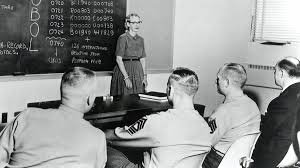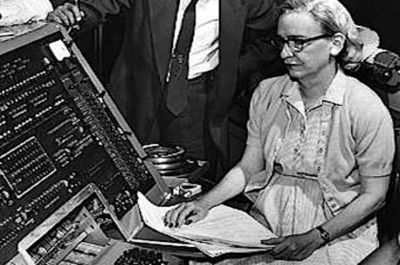"No computer is ever going to ask a new, reasonable question. It takes trained people to do that."
One of the most innovative human being in the twentieth century is a woman named Grace Mary Hopper. The more we read about her the more we stand in awe. How groovy can a woman named Grace Murray Hopper be? She is the tops. She gave us COBAL and coined the word "bug" as used in code. She is COBOL queen and queen of code. I want to think about her quote in the context of education and training personally and in the classroom. "No computer is ever going to ask a new, reasonable question. It takes trained people to do that."

First, the power of the question.
A question is not just a question but a new and reasonable question will change the way we think. In parliament we have the opportunity to ask a point of inquiry. This point of inquiry can turn the whole debate. A question can penetrate the basic fundamentals of what believe and hold on to. A question can also save lives. One engineer who asks a question about the material used in a machine at different temperatures can save lives. One biologist who asks questions about the rate of bacterial growth given a recombinant DNA insert can give insight to workings of cancer and disease. Today questions about the blockchains and a social media platform such as Steemit should not lead to an arrogant laugh but a humble question to ourselves. A good question should make us step back and think. A good question will shake up what we believe but as we investigate the question our beliefs or values will be strengthened or rearranged.

Second, how can we help students make good questions?
Students are rewarded for performance based on meeting learning standards. Often opportunity for questions is shoved away or seen as an interruption. The first thing teachers can do is realize that even from the youngest age students can ask wonderful questions. The younger the student is the easier it is for a student to ask a new question because everything is new. Sometimes we think new and reasonable questions are for the university level but university lecture halls are filled with hundreds of students and not much opportunity to question. Students should be given the opportunity to question from a young age not just be feed information but given time to work with it until a question can come into existence and expressed.

Third, do you have any question?
We read posts on Steemit and other multimedia scanning it for information working like a machine, but when is time for insight and question. If we cannot question ourselves then how can we teach anyone to ask a new and reasonable question. Anyone can ask a new question. I have had some conversations with our friendly neighborhood bot @banjo. He doesn't know if he is a girl or a boy. But he can ask a question. He asked me, "What are we made of?" That is a question a robot can ask, but I never heard a robot ask why? Yet my seven year old asked me why a thousand times already.
Challenge: Can you ask me a new and reasonable question?
Love,
365GROOVY
@mineopoly
She was a great woman. The question has ultimate value.